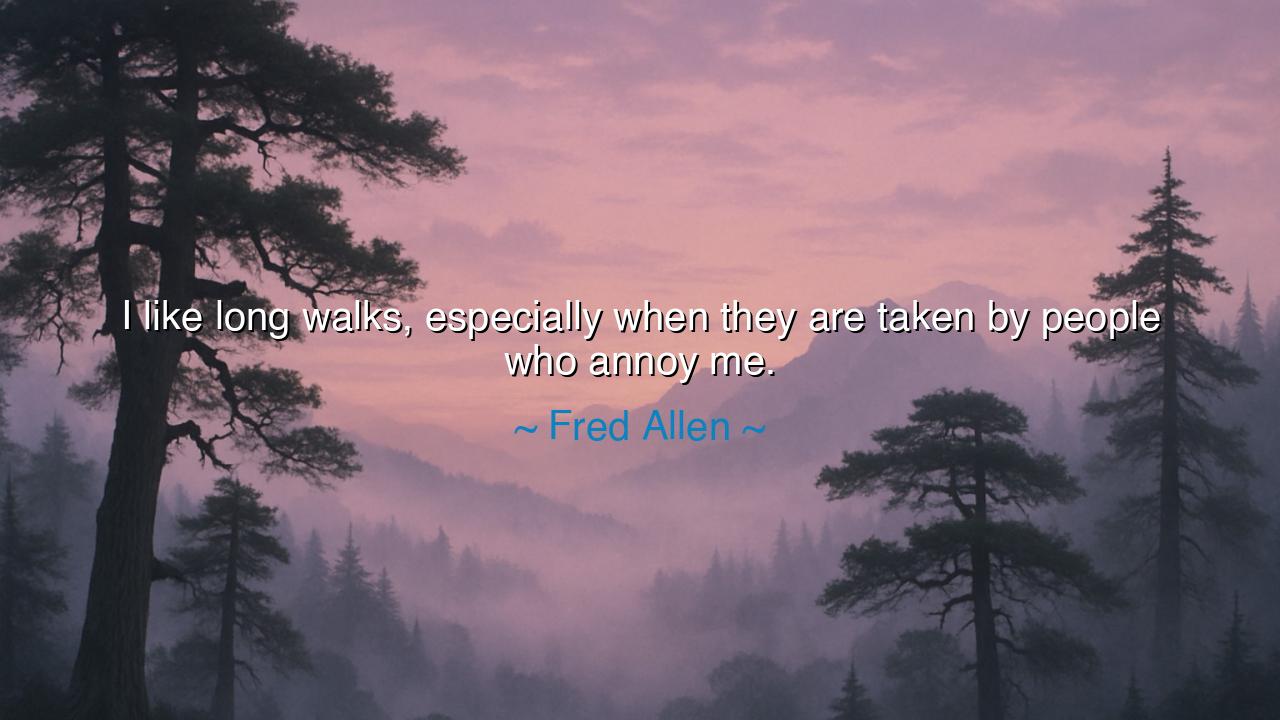
I like long walks, especially when they are taken by people who






In the words of Fred Allen, “I like long walks, especially when they are taken by people who annoy me.” This humorous yet sharp-witted observation speaks to the human condition and the nature of our interactions with others. At first glance, it may seem merely a joke about the pleasure derived from the discomfort of others. Yet beneath the surface, this quote carries a deeper message about the complexity of human relationships, the need for space, and the way in which we often seek solace from those who, whether intentionally or not, disturb our peace.
In the ancient world, the philosopher Aristotle spoke often of the importance of balance in human life. To live virtuously, he argued, one must not be overly influenced by the actions of others. His idea of the “golden mean” encouraged us to seek harmony between extremes—neither to become overly attached to the behavior of others nor to be so detached as to lack empathy. Allen’s quote, though humorously framed, reflects this principle in a modern context: sometimes, in the presence of others' annoyances, we seek a release, a moment to reflect, to step away, and to find peace on our own terms. A long walk, in this sense, becomes a metaphor for the distance we sometimes need from the chaos of the world around us.
Consider the story of Diogenes, the ancient Greek philosopher who lived in a barrel and sought to challenge the norms of his society. Diogenes famously mocked the pretentiousness of the aristocracy and those who were overly concerned with material wealth. He sought solitude and simplicity, often rejecting the expectations of those around him. There is a certain wisdom in Diogenes’ actions—a wisdom that mirrors Allen's quip. Sometimes, we find the greatest peace not by confronting those who annoy us, but by stepping back, taking a long walk, and allowing ourselves the space to reflect and restore. This is the true power of solitude in the face of frustration.
This lesson of retreat also echoes through the teachings of the Stoics, particularly Seneca. He taught that the wise person does not become flustered by the actions of others, nor do they seek to control the uncontrollable. Instead, the Stoic finds their peace through self-discipline, by choosing how to respond to external provocations. Allen's playful statement can be seen as an ironic expression of this Stoic ideal: when others disturb our peace, we need not react in anger or frustration. Instead, we may find release by taking the necessary space to gain perspective, much as a walk can clear the mind and provide a fresh viewpoint.
In the modern world, where we are often surrounded by constant noise and distraction, this lesson is even more vital. In the age of digital communication, we are constantly bombarded by the opinions, messages, and demands of others. The need for personal space—for time away from the noise—has never been more urgent. Allen's wit reveals a truth that transcends the context of mere humor: when faced with the annoyance of others, we often need to step away and engage in a practice of personal renewal. A long walk, or any form of solitude, can be the perfect remedy for the overwhelm of modern life.
Consider the example of Mahatma Gandhi, who, despite the pressures of leading a nation in struggle for independence, often sought moments of solitude. Gandhi would walk for miles, not only for physical exercise, but as a means of clearing his mind and finding inner peace. In this way, he taught the world the importance of retreating inward, even in the midst of great external conflict. It is through these moments of peaceful reflection that we regain our strength, just as Allen's quote humorously suggests—sometimes, it is the time apart from others that restores us.
The lesson here is clear: when we encounter those who irritate or frustrate us, instead of meeting frustration with frustration, we can choose the path of wisdom and self-restoration. Sometimes, the best response is not to confront the source of irritation head-on, but to step back, find space, and allow our thoughts to settle. A long walk—literally or figuratively—can provide the clarity we need to see the situation from a new perspective and to move forward with a calm and collected mind. In this way, we free ourselves from the hold that the actions of others can have on our peace of mind.
In your own life, practice the art of retreat when faced with annoyance or conflict. Understand that you do not need to engage every irritation head-on. Take a moment, step away, and give yourself the space you need to restore your balance. Like the ancient philosophers, find peace in the simplicity of being alone with your thoughts. In this, you will find not only clarity but also the strength to navigate life’s challenges with a calm heart and a clear mind.






AAdministratorAdministrator
Welcome, honored guests. Please leave a comment, we will respond soon